
Vol. 1, No. 22 Published by India China Division, Air Transport Command June 14, 1945
|
Allies Wage All-Out Offensive
Aimed at Recapture of Airbase,
Cutting Off Jap Retreat Artery
with Enemy Retreating to the North
Hq., U.S. Chinese Combat Command, Kunming, China - Chinese troops have entered the important city of Liuchow, it was announced this morning (June 13) by this headquarters.
Spearheading a drive from the west and the southwest, troops of Free China were pushing to the east and north to retake this important town and airbase which fell to the Japanese on Nov. 7, 1944.
Street Fighting
Supported by the planes of the 14th and the Chinese Air Forces, the Allies are waging a full-scale offensive against Liuchow in an effort to block the main Jap artery of retreat toward Hengyang. The outer defenses of the town were entered several days ago and at the present time street fighting is taking place among the ruins with those Japanese troops that still remain.
It is felt by the high command that these last remnants of the enemy are suicide battalions which have been left behind to hold off the Allies while the Japs withdraw to the north along the Kweilin-Changsha corridor.
Kweilin Going
Kweilin, capital of Kwangsai province, river supply base and the location for three strategically important 14th Air Force fields, probably will be occupied soon, according to reports from the Chinese fronts.
The Japanese have been withdrawing their troops from this area in an attempt to move to northern strongholds before the Allies can cut them off in the area of Paoching. The battle for Kweilin is now open, although it is predicted by the military headquarters that this probably will result in merely a token battle.
The fall of these two important cities in the southern provinces will give the Allies larger access to the Kweichow-Kwangsi railroad and further isolate the Japs from their forces which are now engaged by the Chinese along the French Indo-China border.
Kweilin and Liuchow airfields were evacuated by ICD planes last fall when the Japanese pushed into those areas. Before evacuation a "scorched earth policy" was instituted to deny the enemy the full use of the installations.
Growing Offensive
The new stand being taken by the Allies in southern China, the growing offensive is felt to be a forerunner of the full scale battles which are in the offing.
Chinaside forces are making steady gains, biting into the Japanese finger which extends southward from Hengyang.
The enemy must make a determined stand somewhere between Paoching and the corridor, 60 kilometers to the southeast, if that Jap appendix is to be protected.
Withdrawal of enemy forces has been noticed in all sections with the exception of the area around Ishan, a rail town northwest of Liuchow. This town has been occupied by the Japanese troops in their final effort to keep the Allied forces from connecting with the other armies which are now entering Liuchow. (The latest flash from CCC Hq states that the Chinese troops have retaken Ishan, 43 miles west of Liuchow.)
In the far south near the French Indo-China border, the Chinese troops have recaptured Mingkiang and Ningming and are driving toward the border. Further east another column has retaken Tengyun, 165 miles due west of Canton.
Chinese underground workers have disrupted Japanese communications in the west wall provinces of Honan and Hunan, and guerillas on the invasion coast are playing havoc with railways in the coastal province of Chekiang, which lies opposite Okinawa.
Helicopter is Being Used in Rescue Work
Once Inaccessible Jungle Areas Now Open to Air Help
1348 BU, Myitkyina, Burma (Delayed) - Helicopters are now being used to aid in the rescue of downed airmen from the jungle areas of the India-Burma and China Theaters. Censorship was released today (June 14) on the story of the first helicopter used in this part of the world, and the fact that the aircraft is now in use in the work of saving lives.
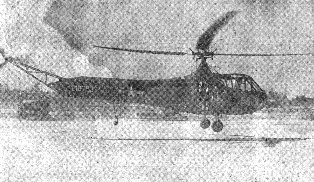 The first helicopter used in jungle rescue takes off at Myitkyina after being re-assembled. It had been dismantled
and flown from Wright Field to Burma in nine days via C-54.
The first helicopter used in jungle rescue takes off at Myitkyina after being re-assembled. It had been dismantled
and flown from Wright Field to Burma in nine days via C-54.
|
Because this type of aircraft can land in small clearings and other inaccessible places where even the lightest liaison plane cannot be used, it is believed that the rescue of men from jungle regions will be greatly improved.
Saves Life
The dismantled YR-4 helicopter was flown from Wright Field, Dayton, Ohio, to this base by ATC and nine days after its departure from the States played an important part in bringing a wounded soldier to the hospital here.
Originally the helicopter was brought to this theater to be used in the rescue of a group of airmen who had been forced down in Burma. While the YR-4 was enroute from the U.S., the men were evacuated. In spite of this a crew led by Lt. Paul E. Shoemaker, engineering officer, began to assemble the helicopter in case another emergency might require its use.
The night of the arrival, the crew was informed that an American soldier at a secluded weather station was badly in need of medical attention. The GI, Pvt. Howard Ross, North Tonawanda, N.Y., had an infected wound as a result of shooting himself in the hand while cleaning a .30 caliber machine gun. Since there were no medical personnel at the outpost which was a ten-day walk from the nearest medical care it was decided to use the helicopter to get him back to a hospital. The decision saved his life.
Lands on Mountain
Escorted by L-5s the helicopter took off and began its flight to the lonely weather station. It was piloted by Capt. Frank W. Peterson, veteran helicopter pilot. At one time on the trip he had difficulty in getting over a 5000-foot mountain but made it on the third try.
The average air speed of the helicopter was 60 miles an hour while the L-5s were 30 to 40 miles per hour faster. Consequently the L-5 pilots were forced to circle to keep the helicopter in sight.
The weather station where Capt. Peterson landed is in the midst of high peaks and is located on a razorback mountain. Peterson, flying alone to make room for the patient, set the helicopter down on a rough strip, 250 feet long, which had been built by the men at the outpost. On both sides of the razorback the mountain fell off steeply to narrow valleys 2500 feet below.
Ross was placed in the helicopter and flown back to a small landing strip at Sinkaling where he was transferred to an L-5 and carried to this base. He has completely recovered.
At present the helicopter, piloted by Lt. Irwin C. Steiner, is being used to locate lost aircraft. On these missions the wrecks are stripped of their valuable instruments and painted so that they may be recognized from the air.
Move Mars Task Force to New Chinese Mission
1348 BU, Myitkyina, Burma - The Mars Task Force has proceeded to China in a vast air movement controlled by this base.
The famed Burma fighting unit was transported in 701 sorties by ICD aircraft, requiring 73 days to complete, 6,234 troops and equipment totaling 1,614 tons were included. "Planet Movement" was the operation's label.
The jungle veterans, who smashed the Japs back through Burma last summer, will be used to augment troops of the Chinese Combat Command.
Shipment was divided into eight phases. Four Burma strips were employed for take-off, and landings were made at five China fields.
The movement, which was made possible partly by curtailment of gas-hauling from this base during the period, encountered many special problems. All kinds of weather were met as the movement proceeded day and night. C-47s previously used only for cargo were equipped with oxygen installations. Skilful piloting was required to get heavily loaded planes off mountain strips not designed for such operations.
Complete organizational equipment went with the troops, including a portable surgical hospital, mortars and hand grenades, field pieces, tentage, supplies and rations.
Units involved in the movement included the 475th Infantry Regiment and the 124th Cavalry Regiment, it was disclosed this week.
'Aerodynamicitical' Engineering is OK, But No Substitutes!
1346 BU, Tezgaon, India - A GI stumbled into the I & E office here one day recently wearing dirty fatigues, a three-day beard, and a sleepy look. "I wanta take da course in aerodynamicitical engineerin'," he said.
"Sure," said the clerk. "Have you had any math before?"
"I got troo de eight' grade, I tink," said the character.
"That may not be enough. Why don't you take a brush-up in math before you start the engineering?"
"I don't want no mat. I want de aerodynamicitical engineerin', an' 'ats all."
"Well you can't have it without some mathematical training," insisted the I & E wallah.
"Okay, bud," said the character, "If ya dawana give me de aerodynamicitical engineerin' cawse, t' hell wit ya."
With this he turned on his heel and strode out.
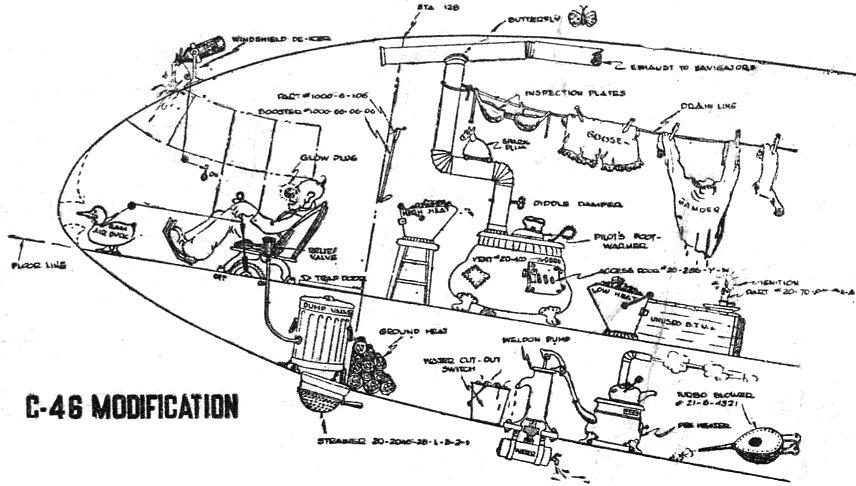
|
New "Critical Score" to Come Out in July
Washington (ANS) - A new critical score for discharge will be announced in July, the Army said this week. Some reduction of the minimum 85-point score is expected. The statement added that the two million soldiers to be returned to civilian life next year will include those released on account of wounds or sickness.
Pioneer New Way to Make Friends
Dale Carnegie's Method May Be Best Way, Walkouts Admit
1352 BU, Mohanbari, Assam, India - The "pinpoint bombing" of a search and rescue unit crew recently went amiss and nearly backfired on an aircrew walking out of the jungle.
One method by which the searchers help get bailouts back "home" after a trip through "head-hunting" country is to "soften-up" the local populace by dropping supplies and trinkets along the route ahead of the men walking out. The plan serves as a goodwill builder-upper to induce a friendly reception even from a belligerent hill dweller.
Following the customary procedure, Lt. Harold R. Haviland, pilot, and a crew took a rescue plane out every day to check on the progress of Lt. Peter R. Delonga and his downed crew walking out of the hills in Burma. No white men ever had traveled this particular bit of terrain, according to the records, and although the men didn't know it, they were on the short end of two-to-one odds against getting out.
After helping Lt. DeLonga and his crew with supplies and words of encouragement on a walkie-talkie, Lt. Haviland flew on ahead, dropping gadgets and trinkets for the "softening up."
Cpl. James C. Brantley, the "kicker," stood near the door, awaiting the green light signifying the plane was over the village compound. When the light flashed Brantley heaved out a bag of rock salt. It plummeted earthward, struck a basha roof, smacked an inhabitant on the head and felled him like an ox. At that point good neighbor policy all but went out the window.
Although Lt. DeLonga and his men managed to slide through the village and get back to their base, it was reported that despite the crew's most neighborly smiles, the hill people didn't exactly welcome the men like long lost relatives from Kokomo.
Price for Taking Army '45' Comes High for China Thief
Hq., 14th AAF, China - It was quiet at the small field just outside this airbase. In the nearby rice paddies coolies bent their backs to their work; in the air overhead the transport planes and fighters roared back and forth.
Down the road from the village a crowd of people shuffled toward the field. Only a trickle at first, the crowd grew larger until 1500 people were standing around, waiting. Today they would witness an execution.
Stole Pistol
From the gates of the village, from the haze that always blankets the countryside, came the blare of trumpets and the shout of soldiers. Three soldiers headed the procession which moved slowly toward the crew. Following close behind, four men carried the condemned man, who was pinned to a platform slung on poles.
Wong Ling Tzun lay quite still on the platform. He was too scared to move, too dazed to care. Two days before he had been caught with a U.S. caliber .45 automatic pistol in his possession. He had stolen it from a C-47 parked on the airfield. In trying to escape he had been shot in the leg; Chinese military authorities had imposed the death penalty. Now he would die.
Coupe de Grace
At the field the prisoner was rolled off the platform onto the ground. There was no sound as the executioner dismounted and took an M 1903 Springfield rifle from his gun-bearer; even the pleasant chatter of Chinese laughter had ceased. Standing over the hooded, prone figure he fired one shot, waited 45 seconds and sent another slug into the still-squirming body.
With just a moment's hesitation he again approached the body, gave it a shove with his booted foot and applied the coup de grace. Wong Ling Tzun had paid his debt to the Chinese military authorities.
Two soldiers tossed a grass mat over the dead thief as the executioner and the regimental troops marched back to town. Slowly the crowds dispersed. One by one they gave the still figure a last look and turned back to town.
It was quiet at the small field just outside this airbase. In the nearby rice paddies coolies beat their backs to their work and the planes roared back and forth. In the middle of the field lay a mat-covered figure - quite still.
Wonder, Alarm, Near-Reform as Earthquake Shakes Delhi Base
Furniture Dances About in Forty-Minute-Long Temblor
1307 BU, Delhi, India - A slight earthquake brought men of this ATC base running out of their barracks as it shook New Delhi and the surrounding area for forty seconds Monday evening at seven o'clock. Most of the men were off duty at the time the quake struck. Some didn't realize what was happening while others thought that they were getting dizzy from the heat as tables, chairs and beds shook and walls quivered.
Cpl. George M. Tonsho was sitting on his bed talking to some buddies when everyone suddenly became quiet.
"The floor seemed to be moving," he said. That was enough for Tomsho and the rest and they dashed for the door, but when they got outside it was all over.
"I was sitting in the day room writing letters when I heard a low rumbling sound and the floor and walls began to vibrate," said Cpl. Lecil McDonald, of 10th Weather. "It was all over so fast that I thought it was imagination until someone ran in and told me that it was an earthquake."
The quake, said to have originated 230 miles northeast of here, also had its humorous side. Two officers were indulging in a bit of drinking when the room began to quiver. One of them, who had just downed a slug of Indian whisky, didn't say anything but quickly reached for another drink. Just as he gulped it down the second tremor came. Commenting later he said, "I didn't know it was an earthquake and for a while I was certainly ready to sign the pledge."
CHINA This Week
by Dwight Coolie
WHAT, NO COUPONS?
One evening at a forward base in China an abortion of a truck drove up to a plane just in from the Hump and off-loaded the gas. When all the barrels had been lifted, the truck drove off. Past the gas dump, past the warehouse and out the gate toward the nearest town it went.
The MPs (bless their hearts) decided something was a little fishy. They stopped heckling a hatless private and into a jeep and away.
The truck pulled up to an old storehouse in town and the local gang started unloading the barrels just as the "cops" arrived.
"Hey, you guys! That's not where we store the gas around here. Put those barrels back on the truck and let's go."
The gas went back to the dump, the truck drove off . . empty, and the MPs went back to hunt up the private without a hat.
GUSHER...
In a lonely part of China where the pipeline crosses the hills, the men that tend the pipes are always having trouble.
Once in a while the gauges go screwy, the gas flows slower and then dies to a trickle. The boys hop in their wagon and drive off to the hills - they have a pretty good idea of where the trouble lies.
Sure enough, at a place where the pipe pokes out while crossing ravines, the local big-dogs have stopped to gas up. These refugees from a gas station drive their trucks under the pipe, place a couple of empty barrels beneath it and rip-rip-rip goes the hack saw.
Worst part about the whole thing is they forget to put a stopper in the holes before they drive off and more gas than somewhat foes gushing to the ground.
AW, RATS...
Quote from a Chinese newsrag: ""Some one brought up the story of a certain professor eating rats, and another man demanded the story-teller point out the professor who ate the rats."
Hungry too, huh?
Food must be awful scarce these days - but then real rat meat might be a change from C-rat(ion) meat.
COMES THE TEST...
Chinese armies, which during the past few weeks have been going all out in their push against the Japanese, may meet the test of their strength as they get closer to larger enemy forces.
In several campaigns, Nanning for one, the Japs evacuated their positions before the Allies came on the scene. It is believed by some strategists that they are withdrawing toward Manchuria for a last stand. Although this would seem sensible since it would shorten their supply lines (Japan reputedly has two million troops in that area) it would also be dangerous because it places the big fight closer to the Russo-Siberian border. If events were favorable the Chinese and Russians could apply the old squeeze play and give Time magazine another opportunity to break out with the glamour maps, complete with wedges, pincers and clamps.
TEAMING UP...
By retaking Liuchow, Kweilin and Paoching and the surrounding areas in Hunan and Kwangsi provinces, the Allies would make "kaput" the Jap appendix which extends towards the French Indo-China line. This would give open lanes to the China sea. Down south it shouldn't be too hard a job since the Japs apparently have neglected to prepare for a big fight. But when the fighting moved to the old northeast provinces, probably well fortified, watch the smoke.
All through occupied China, guerilla forces are reported to be heckling the enemy; tearing up important railroad tracks, sneaking in to take a poke here and there, making things uncomfortable for the Jap.
|
Most Bemedaled Sergeant
Wears a Total of 17
Garnered Awards and Points in European Theater As Radio Op
1342 BU, Chanyi, China - The most bemedaled member of 1342 BU is blond, mild, T/Sgt. Kenneth J. Brown, whose chest would look like mother's washline on Monday morning if he were to hang all 17 awards he has been presented.
Sgt. Brown, a recent arrival in this theater from the ETO, holds 14 Air Medals, one Distinguished Flying Cross and two Purple Hearts.
Returned to States
The sergeant, a radio operator whose home is in Ellwood City, Pa., first went overseas in June, 1943, and was stationed in England. It was during this period of service that he flew 75 missions and received all 17 decorations. He received the first Purple Heart after being hit with flak fragments in the right arm and shoulder on Aug. 2, 1943, in a mission over France, and the second for a crash-landing July 25, 1944, on the coast of England.
After completing his tour of duty in England, Sgt. Brown returned to the United States for five months. It was there that he was assigned to ATC, was given radio refresher training at Reno, Nev., and then sent to this theater.
ATC Pilots OK
For an unmarried man, the sergeant also has the high number of 157 points under the readjustment system. Sgt. Brown entered the Army on Dec. 31, 1941, has 18 months of overseas service, and wears two stars on his European Theater ribbon.
The radio operator arrived at this base late in March and since then has flown more than 150 hours with this unit. In comparing the hazards of flying and the skill of the pilots, Brown asserts that transport pilots in China are doing as fine a job as the officers he rode with over Europe.
 One stimulating mail delivery brought in these two leg line-ups, comparison of which might be of great interest to those
wondering whether they really want to go home. On the left are some civilian employees in Karachi, on the right
some Earl Carroll plackets in a buncombe deal. Note that the Karachians have a major, while the home tidbits are
alone. (But then you know all about that.) Note too that the Snakesiders have but one pair of pins each.
Americans have more of everything.
One stimulating mail delivery brought in these two leg line-ups, comparison of which might be of great interest to those
wondering whether they really want to go home. On the left are some civilian employees in Karachi, on the right
some Earl Carroll plackets in a buncombe deal. Note that the Karachians have a major, while the home tidbits are
alone. (But then you know all about that.) Note too that the Snakesiders have but one pair of pins each.
Americans have more of everything.
|
 Free Speech ?
Free Speech ?
What a deal!
We find that we can't even express what we believe to be the opinion of the boys in the field, the boys that are out there fighting this war.
We had written two editorials this week on subjects we thought were important to GI Joe, which we thought expressed the way he felt on the stuff. The first one was about the way things are being run in the veterans' hospitals back in the States. We had intended to tell you guys just what the score was and just how those veterans are being treated . . . but no go.
The second editorial covered certain phases of the proposed peace-time draft which is being tossed back and forth by Congress. This is definitely something which affects the soldier. Soldiers are fighting this war and anything done to prevent future wars will be greatly appreciated by all men in uniform. This, too, was censored.
We have no beef with the censor. He has his orders. He could not pass the editorials.
We have had jolts like this before, though not two at a time. They have always stirred up earnest discussions among men here - men whose rank runs a gamut of 14 grades - as to what our obligations to readers, which liberties we dare not hope for, and what course policy ought to take between the two.
Since you are told that this is "your paper," and given - we hope - some reason to consider it such, you may reasonably be irked at times to find that it opposes fatal accidents (nobody favors them), upholds loyalty (even the disloyal do), believes military security necessary (a fool knows it is) - and so forth.
Why, you may ask, if it's in any sense yours, hasn't it an opinion on the San Francisco conference - conscientious objectors' discharge - other country's politics - compulsory military training - social security - veterans' hospitals?
It has. Two of the killed editorials were on two of these questions.
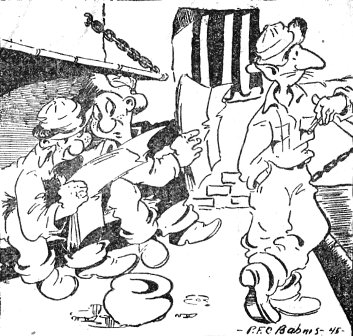 "I don't trust that guy."
"I don't trust that guy."
|
We don't want this sheet to pussyfoot any more than it has to, and you may be sure it never will.
But we and you will temporize for a while yet whether we like it or not, so we may as well dislike it as little as possible.
When we raised our right hands in Newark or Fort Snelling, we gave up a lot of the freedom our people at home still have. When we came overseas we gave up a lot more. Do we have freedom of speech and of the press? Yes. They are waiting for us when we take off these clothes and resume our own.
A Man's Man
Gen. George S. Patton, Jr., proved in a recent speech at the Memorial Coliseum in San Francisco that he is a man's man - the type of officer capable of inspiring GIs to exert their utmost and even to lay down their lives, if need be!
The general, dubbed "Old Blood and Guts" because of his reputation as a fighter, insisted that glory for victory over Germany should go to his men, not to generals, saying:
"Give the young fellows the glory. They get damn little else out of war. Besides, they're the ones that fought it and they'll be the ones who'll have to fight the next one, if there is one. Old guys like myself will be gone - and a general gets enough fame just being a general . . ."
At the city hall the general, in an address to a large crowd, also gave the nod to the GIs who "did the fighting." He thanked the throng for the ovation, but remarked:
"This ovation would have turned less steady heads than our own, but we are only the symbol of countless gallant men. Those gallant men won these medals" (pointing to rows of ribbons on his battle jacket). "We only wear them!"
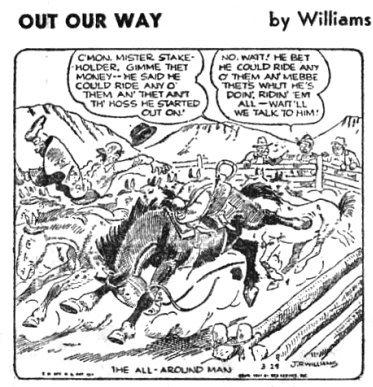
|
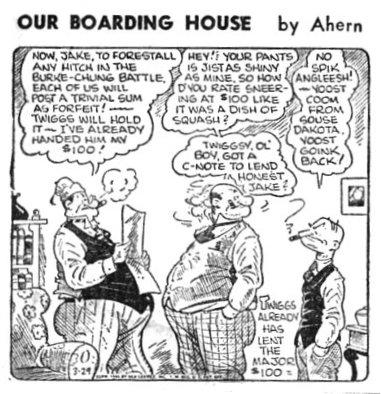
|
|
Fighters are graceful and glamorous things With lady-like lines and close-cropped wings; Bombers are great with their bullets and guns, Precision tested for death-dealing runs, But the transport plane with its dirt and its grease Gives wings to the cargo that must not cease. While the hot boys gather public acclaim, And the papers are full of spectacular game, The Dumbos and tankers fly into the sun To do a job that's only begun. They conquered the Hump through guts and through grit, They washed it away with their sweat and their spit. It wasn't rash talk that made the grade, It was guys who came . . . and guys who stayed. It wasn't the boasts of idle men, Nor flights being made just now and then; But the will to carry the stuff across Despite the price, and despite the loss. Men of the India China Division Have made this their first and final decision. "We'll get the stuff there, and we'll get it there fast, Till the Japanese empire's a thing of the past."
1st Lt. Rus Walton
|
 Butt Sitter
Butt Sitter
Editor:
I have what I consider an authorized gripe. I am a trained radio operator and have been doing that work while in the Army, but now am stationed at a field which has no based airplanes, and therefore no need for radio operators. Hence I am being grounded for no fault of my own.
My friends write to me from other fields that their bases are very short of trained radio operators, and here we sit on our butts with no ships to work on. It don't make sense!
Is there anything that can be done for this mess? It seems to me that they spend enough time and money to train radio operators so that they should be anxious to get the best out of them.
- Sgt. Anthony Baldasare, 1338 BU (Yunnanyi, China)
Ed.- Looks like a bad slip-up somewhere. We have bucked your letter on to the personnel section with a request for action on your case, and we hope you will soon be off your butt.
What the Hell !
Editor:
How in the hell is it that other outfits are sending all men back to the States with 85 points or better and the ATC is even lax about sending men home with 90 points or better?
Now don't give me that critical-shortage-of-men story. There are plenty of ATC personnel in India.
We here are pretty well down in the dumps and our morale is at a low ebb. Let's not hold up the boys who have done their share.
- Pfc. John Knobl, 1342 BU (Chanyi, China)
Ed.- We fear the story of those other outfits is a wild canard. We haven't heard any good reasons to think that the ATC boys won't get as good breaks as others when the time comes to go home, but for most of us, unfortunately, it isn't here just yet.
|
'Sanitary Hotel' Offers Them
Modern Living Accommodations,
U.S.-Type Vacation Pleasures
1350 BU, Kunming, China - Nestled in a pleasant valley some 25 miles from Kunming lies Western China's most modern village, Hot Springs.
There the old and the very new blend in a series of straw-thatched huts and modernistic shops. The swank, five-story "Sanitary Hotel" is the main building in the town.
To get away from the hum-drum life at Kunming, GIs can take a special service conducted tour to Hot Springs. The trip takes one over the winding, knoll-hugging Burma Road, and about six miles along a picturesque side road.
Once there, one is free to do as he pleases. There is hunting for the vigorously active. Some prefer to loaf. They can relax in the sun by the banks of a rural stream beside the ancient, warped water wheel.
Most GIs cannot resist the urge to loll in the therapeutic, sulphurous waters of one of Hot Springs' 31 bath houses.
Everyone tops off a perfect day with the elaborate five-course dinner at the hotel.
For $15 gold, the customer at Sanitary Hotel gets a room, three meals, and two baths in the springs. From his room the customer has merely to walk down a flight of stairs to the baths.
The baths themselves are steaming hot and there is a steady change of water all the time. The high sulphur and other chemical content of the baths has proved beneficial in countless cases and many of the prominent and wealthy Chinese live the year round at this ultra-modern spa.
Ping pong games are always in session with the Chinese guests invariably winning over their somewhat less dexterous American friends. The main diversion seems to be sitting on regular stools up before a very Stateside cocktail bar and swapping yarns over the day's doings or just strolling through the well tended flower gardens that surround the hotel.
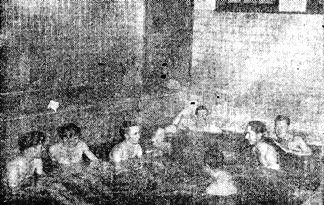 Frolicking in the hotel's tiled pool of mineral water, GIs steam out the kinks that are inevitable after the ride over
the rough roads.
Frolicking in the hotel's tiled pool of mineral water, GIs steam out the kinks that are inevitable after the ride over
the rough roads.
|
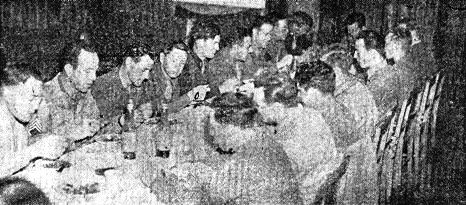 After the baths, the elaborate dinner in Sanitary Hotel's airy dining room is an excellent way of topping off a day.
Delicious steaks and southern fried chicken frequently are found as the piece de resistance on the menu.
After the baths, the elaborate dinner in Sanitary Hotel's airy dining room is an excellent way of topping off a day.
Delicious steaks and southern fried chicken frequently are found as the piece de resistance on the menu.
|
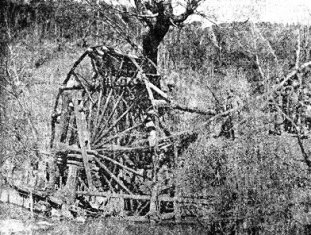 Giving up a hopeless chase, many a hunter has succumbed to the drowsy appeal of this rural scene. The ancient
waterwheel is used to bring the stream's water to high ground on the banks for irrigation purposes.
Giving up a hopeless chase, many a hunter has succumbed to the drowsy appeal of this rural scene. The ancient
waterwheel is used to bring the stream's water to high ground on the banks for irrigation purposes.
|
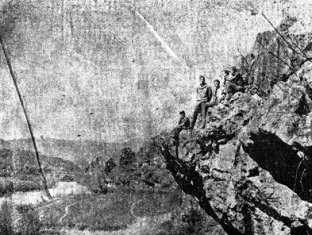 A group of GIs views the sleepy little village of Hot Springs from one of the many craggy cliffs. Below this
promontory a series of caves offer a fascinating study of ancient paintings and inscriptions.
A group of GIs views the sleepy little village of Hot Springs from one of the many craggy cliffs. Below this
promontory a series of caves offer a fascinating study of ancient paintings and inscriptions.
|
India-Tibet-Sikang Caravan Supply Run
Has Been in Use for Thousands of Years
30,000 Mules Plod 1,700 Miles in Journey Taking Many Months
Couriers of Genghis Khan Followed Route in 13th Century
1353 BU, Chungking, China - One of the oldest lines of supply across the Hump is the India-Tibet-Sikang caravan to China.
Its origin dates back more than 4,000 years to the time when traders and merchants crossed the mountains and plains to carry their spices and silks to the people of Holy Lands. Genghis Khan's couriers used the route way back in 1162-1227, as shown by various sign posts and gate markings along the way. Marco Polo wrote of his travels over the roads when he visited the Far East in 1277.
Today the caravan of approximately 30,000 mules starts its 1,700-mile trek from Cawpore, India, passes Lhasa in Tibet and ends at an undisclosed destination in China. The journey takes four to eight months depending on the weather, the condition of the trails and the amount of trading done en route.
Operated by some 5,000 transportation companies, the route is kept open all year except for one or two months when some parts are snowbound. The merchants usually employ people of the lands through which the caravan passes, and as a result of this co-operation, highway robbery has never been reported.
Wages are paid in Indian currency, one completed journey costing about Rs. 600 per mule. When traffic over the caravan-way makes it necessary the companies are prepared to increase the number of mules and horses to more than 60,000.
Today important war materials and essential living items are substituted for the more romantic cargo of the past. Tires, electric wires, motor spare parts and medicine replace the silks, spices and jewels of yesteryear.
'Finest Theater in CBI' Opens at 1346th BU
Stage Five Curtains Deep, Good Seats for 1,000 are Features
1346 BU, Tezgaon, India - The "finest Army theater in the CBI" opened here recently before 1500 GIs, officers and visitors.
Author of that description is singer Tony Martin, headliner in an all-star, all-Army cast that opened the new theater.
"I've toured every ATC, ASC and AAF theater in the CBI,
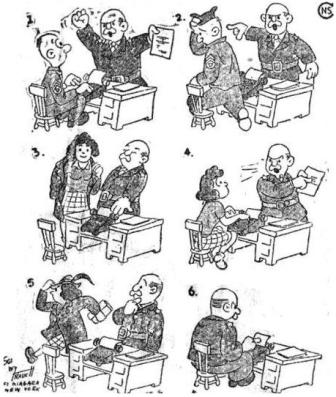
|
The stage is five curtains deep. Seats, not bomb racks, are provided for 1,000 persons. Constructed of airstrip matting and wood, they are set up in sections with aisles running down the center and sides. A pagoda-type projection booth is set on a triangular base and is equipped with a spot light for the stage shows.
Lt. Col. J. H. Smart, commanding officer, officially opened the theater, welcomed the visitors and rivaled the entertainers in applause when he read two telegrams he had received within a few minutes of curtain time.
The first wire stated that this base had set an all-time record for keeping its Hump-flying planes in the air. The second brought to all the base personnel the congratulations of Brig. Gen. Tunner for having set the record.
Songs written in the CBI expressly for CBI personnel were spicily handled by the Syncopaters Quartet. Honey Coles, tap dancer and novelty singer, sang two of his own compositions. "Baksheesh, Sahib" and "It ain't the Sergeant, ain't the Corporal, it's the PFC."
Leonard Pennario played the piano scales from Bach to boogies woogie and Pete Badrich's caustic partner, "Sub-Private Oscar," happily insulted everybody. Leon Fields, veteran comic, MC'd the show.
The band, led by CWO Harold E. Waite, played a concert at the opening of the program. A specialty dance band drawn from its members furnished background music for the entire show.
HUMP EXPRESS is the official newspaper of the India-China Division, Air Transport Command, APO 192, c/o Postmaster, New York, N.Y., and is published by its Public Relations office. Camp Newspaper Service and Army Newspaper Service features are used, reproduction of which is prohibited without permission of CNS and ANS, 205 East 42nd St., New York, 17, N.Y. Other material is submitted by staff members, ICD-ATC base Public Relations sections and other soldier correspondents. Printed weekly by the Hindusthan Standard, 3 Burman St., Calcutta, India, and distributed each Thursday. Passed by U.S. Press Censor for mailing.
| Military transport schedules over India for cargo, personnel and mail . . . maximum tonnage of essential war materials over the Hump . . . movement of troops and supplies in support of tactical operations in China . . . evacuation of the sick and wounded - these are the missions of ICD-ATC. |

JUNE 14, 1945
Original issue of HUMP EXPRESS shared by CBI veteran Steven C. King, author of Flying the Hump to China.
|
|
Copyright © 2007 Carl Warren Weidenburner
MEN OF ICD THE HOVERFLY IN CBI
TOP OF PAGE PRINT THIS PAGE ABOUT THIS PAGE E-MAIL YOUR COMMENTS
PREVIOUS ISSUE HUMP EXPRESS BASE NEXT ISSUE
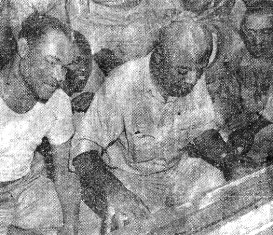 While Fight-Champ Henry Armstrong admiringly watches his nimble fingers, Jive Operator Dan Burley gives out with
some genuine boogie, and around the pair crowd members of the cast of "The Listening Skies," 1333's Negro song festival
which was in rehearsal when they visited. Between Armstrong and Burley is Robert Lillman, Detroit; at right,
Walton K. Carter, New York.
While Fight-Champ Henry Armstrong admiringly watches his nimble fingers, Jive Operator Dan Burley gives out with
some genuine boogie, and around the pair crowd members of the cast of "The Listening Skies," 1333's Negro song festival
which was in rehearsal when they visited. Between Armstrong and Burley is Robert Lillman, Detroit; at right,
Walton K. Carter, New York.
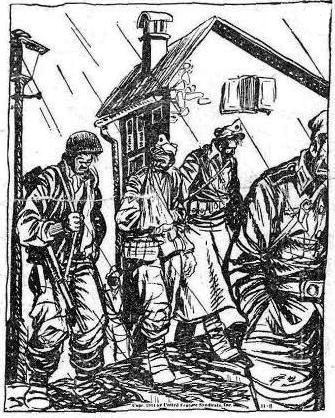
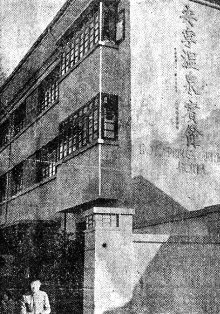 The modern, streamlined architecture of Hot Springs' excellent hotel stands out in stark contrast to its ramshackle huts.
The modern, streamlined architecture of Hot Springs' excellent hotel stands out in stark contrast to its ramshackle huts.
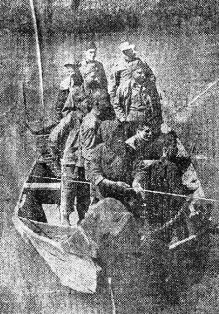 GIs from the Kunming base share the Hot Springs ferry with a gnarled, leathery coolie and a couple of Chinese tots.
GIs from the Kunming base share the Hot Springs ferry with a gnarled, leathery coolie and a couple of Chinese tots.